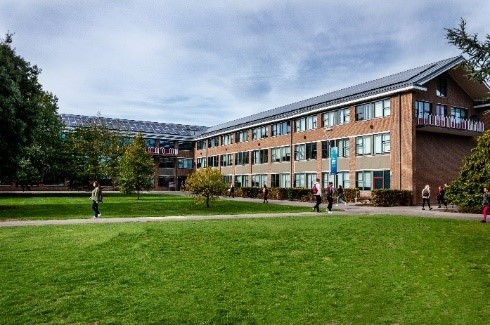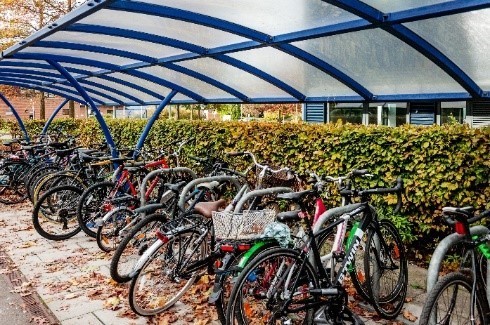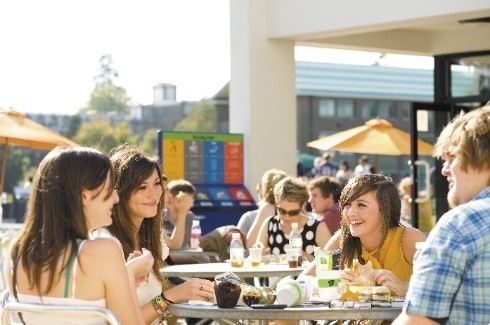University of Reading
The University of Reading’s Sustainability Services have become recognised as a leader in delivering environmental sustainability in operations. From sector-leading carbon reductions, to robust and progressive waste and travel strategies, the University continues to reduce its environmental impacts year-on-year, underpinned by strong management systems certified to the international ISO140001 and ISO50001 standards.
Sustainability at the University
The University of Reading has a strong academic record on climate change and sustainability research working across disciplines to tackle global issues. Research topics cover areas of flooding, drought and water-quality, to atmosphere simulations and developments in climate-resilient societies.
Setting baselines and targets
In order to measure progress, Sustainability Services measures the University’s carbon footprint against a baseline of 2008/09 and water consumption against a baseline of 2011/12. The University delivered on its target of 35% carbon reductions late 2016 which has seen significant financial savings too. This work enabled the University to set a further carbon reduction target of 45% by 2021, as part of its Carbon and Water Management Plan (CWMP). A selection of the types of project being undertaken to deliver these carbon reductions are:
- Battery storage
- Solar panels
- Energy Centre at the main Whiteknights campus
- District heating network extension
- Compressor upgrades
- Lighting replacements
- Upgraded fume cupboard ventilation
- Comprehensive metering rollout
- HVAC improvements
- IT efficiency including server rationalisation
Sustainability have developed a 5-year Waste Strategy which sets ambitious targets along the themes of reduce, re-use, recycle, review and report, to reduce their environmental impact even further by 2020/21:
- Reduce total waste produced by 5% per capita (staff and student FTE)
- Increase the University's annual recycling rate to 60% (2017 recycling rate is 50%).
- Achieve a 10% increase in re-use against the 2015/16 baseline, in order to improve a culture of re-use rather than disposal.
- Review opportunities to reduce hazardous waste.
- Review reporting of construction waste and advance waste management practices further up the waste hierarchy.
- Annual reporting on quantitative waste management impacts, and other sustainability impacts achieved as a result of the Waste Strategy projects.
Engagement and Awareness
The University recognises environmental awareness as a key aspect of the environmental management of its estate. As part of this awareness, Sustainability Services run a yearly communication and engagement programme. This includes a variety of approaches and programmes encouraging collective actions:
- Staff are encouraged to use JUMP; an activities based rewards platform that encourages users to think about and move towards more sustainable options by implementing changes to travel, using energy, recycling and purchasing behaviours
- The University provide cycling skills training to support safe and sustainable travel for staff and students
- The roll out of improved waste facilities and consistent signage helps ensure anyone on campus has the best possibility opportunity to recycle
- Sustainability Services annually run a Green Festival which includes events like tours of the Energy Centre, tours of solar PV installations and Green Career events
- All staff undertake a mandatory online sustainability training course to better understand sustainability at the University
- Supporting live projects for academic students and courses from a variety of academic groups
Travel to Campus
The implementation of various travel initiates such as Easit discount, electric vehicle charge points and free bicycle maintenance has contributed to increasing the journeys made to campus by staff and students being completed using sustainable modes. When the travel survey was collated in 2018, the University had met its target of 83% four year early, and so set a further stretch target of 87% by 2022.
The future
Sustainability Services is looking at innovative ways to meet and even exceed the University’s next sustainability targets. The use of renewable technologies is already integrated into some parts of the campus, including a ground source heat pump, solar PV and solar thermal cells. These technologies will become increasingly important in the future.
For further information about what Sustainability Services do at Reading, please visit our website: www.reading.ac.uk/sustainability/
Main Contact Name: Dan Fernbank, Energy and Sustainability Manager
Main Contact Email: sustainability@reading.ac.uk
Share with us: www.twitter.com/UniRDG_Sust/
www.facebook.com/UniRdgSust/













